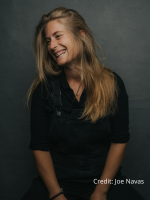Greg Connors stands on his boat in Wychemere Harbor in Harwich Port, loading up totes of monkfish and skate. He and his crew are just back from an overnight fishing trip to southern New England, and now they’re offloading their catch to a wholesaler.
"We probably have 12,000 pounds of fish on the boat today. They’re mostly going to Europe. It seems kinda silly — the vast majority of that is gonna get shipped overseas but meanwhile, the vast majority of restaurants that are selling fish in the area are selling fish that comes from overseas. It just doesn't make a lot of sense to me," Greg explains.
This is a phenomenon that’s been growing for decades. The species available locally have shifted — not only because of overfishing, but also because of climate change — but local demand has stayed the same.
"Back in the day we used to catch codfish all year round, codfish, pollock, haddock, and everybody just got used to it, nobody wanted to take it off the menu. In the meantime the ocean changed its mind, it’s not offering that up anymore, it’s offering something different."
I asked if he remembered the transition of when things started changing in terms of what was coming out of the water locally.
It wasn’t abrupt, he said.
"It was a slow creep, you know, for me, there’s just as much protein in the ocean if not more than there was when I first started, it’s just a different kind. You know the ocean’s just it offers up what it offers up, and I think we have this thought in our head that we can force it to go back to the way it was, and it’s just not like that."
Greg started fishing in the late 1980s, and at that time local menus were a pretty accurate reflection of what local fishermen were catching. But today, the National Oceanic and Atmospheric Administration or NOAA estimates that 70 to 85 percent of the seafood we eat in the U.S. is imported from other countries. At the same time, New England fisheries catch more than enough seafood to feed our region, but as cooks we’re just not familiar with species monkfish, dogfish, and skate. Greg says he gets it. He’s still learning to cook these groundfish.
I asked Greg how he likes to cook monkfish.
"I like to do it medallions, to take the tail off and it come out the tail filets of these two, tenderloin shaped things. The bone only runs right down the middle of the tail. And I medallion it up. I like it on the grill, lemon pepper or Cajun seasoning, stuff like that. It's really good."
Greg says he’s also seeing starting to see skate in restaurants more often.
"I went to the North end a couple of years ago and there was skate on the menu as a primary dish, and the skate was in the seafood fra diablo. So it's culturally like in the Italian section in Boston that's become part of their diet."
Despite the fact that monkfish and skates and particularly dogfish are often seen locally as undesirable species, in Europe dogfish is so popular for fish and chips that native populations are overfished and now they’re importing our catch of the species. Similarly, monkfish livers fetch a high price in Japan where they’re used in sushi, and the meat is popular in France as a main ingredient in bouillabaisse — or seafood stew. More locally, the Cape Cod Commercial Fishermen’s Alliance is working with local chefs to help educate the public about how to cook these unfamiliar species. Cultural change is a slow process, but all of these efforts make Greg Connors more hopeful about the future of local groundfishing.
"I do appreciate a lot of people are starting to sort of take a more interest in reaching out and looking at the more under a lot of utilized species and the more locally available species. And I think I hope that grows legs," he said.
He added, "I mean, I hope they get some momentum because it's a super positive thing for our industry."
—
Learn more:
Recipes for underutilized species from the Cape Cod Commercial
Fishermen's Alliance:
https://capecodfishermen.org/local-seafood/recipes/
A history of the CCCFA's 'Pier to Plate' program, including recipes:
https://capecodfishermen.org/piertoplate/
A June 2022 feature in the Boston Globe about our region's changing catch, and how wholesalers and chefs are responding:
https://www.bostonglobe.com/2022/06/22/magazine/new-england-waters-are-teeming-with-fish-species-problem-is-we-eat-too-few-them/








